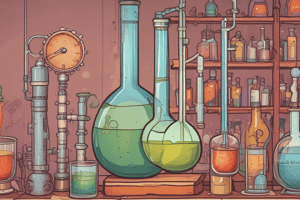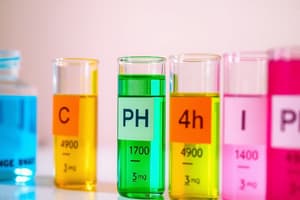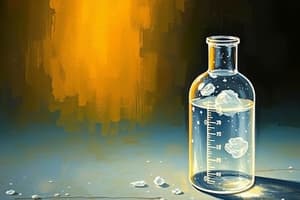Podcast
Questions and Answers
What is the pH value of a solution that is strongly acidic?
What is the pH value of a solution that is strongly acidic?
- 10
- 14
- 7
- 1 (correct)
Which of the following is an example of a strong base?
Which of the following is an example of a strong base?
- Hydrochloric acid (HCl)
- Carbonic acid (H₂CO₃)
- Ammonia (NH₃)
- Sodium hydroxide (NaOH) (correct)
In a neutralization reaction, what are the primary products formed?
In a neutralization reaction, what are the primary products formed?
- Salt and acid
- Base and salt
- Water and salt (correct)
- Water and acid
Which type of salt is formed when hydrochloric acid reacts with sodium hydroxide?
Which type of salt is formed when hydrochloric acid reacts with sodium hydroxide?
What does a lower pH value indicate about a solution?
What does a lower pH value indicate about a solution?
Which of the following is classified as a metal halide?
Which of the following is classified as a metal halide?
What is the defining characteristic of an acid?
What is the defining characteristic of an acid?
Which acid is considered a strong acid due to its high degree of dissociation?
Which acid is considered a strong acid due to its high degree of dissociation?
What is a characteristic property of bases?
What is a characteristic property of bases?
In a neutralization reaction between HCl and NaOH, what are the products formed?
In a neutralization reaction between HCl and NaOH, what are the products formed?
What is the pH value of a neutral solution?
What is the pH value of a neutral solution?
Which type of salt is formed when hydrochloric acid reacts with sodium hydroxide?
Which type of salt is formed when hydrochloric acid reacts with sodium hydroxide?
Flashcards are hidden until you start studying
Study Notes
Acid-Base and Salt: A Fundamental Chemistry Perspective
Acids, bases, and salts, three interconnected concepts, form a crucial foundation in the study of chemistry. In this article, we will delve into the properties and interactions of these fundamental substances, shedding light on their role in various natural and industrial processes.
Properties of Acids
An acid is defined as a substance capable of donating protons (H⁺ ions) in aqueous solutions. Acids exhibit characteristic properties, such as:
- Sour taste (citric acid, vinegar)
- Formation of hydrogen ions in water (HCl, HNO₃)
- Reaction with certain metal carbonates and hydroxides to produce carbon dioxide (HCl + CaCO₃ → CaCl₂ + CO₂ + H₂O)
The strength of an acid is related to its ability to donate protons and its tendency to dissociate in aqueous solutions. Strong acids like hydrochloric acid (HCl) and sulfuric acid (H₂SO₄) are almost completely ionized in water, while weak acids like acetic acid (CH₃COOH) only partially dissociate.
Properties of Bases
A base is a substance capable of accepting protons (H⁺ ions) in aqueous solutions. Bases exhibit characteristic properties, such as:
- Basic taste (sodium hydroxide, ammonia)
- Formation of hydroxide ions (OH⁻) in water (NaOH, KOH)
- Reaction with acids to produce water and a salt (NaOH + HCl → NaCl + H₂O)
The strength of a base is related to its ability to accept protons and its tendency to dissociate in aqueous solutions. Strong bases like sodium hydroxide (NaOH) are completely dissociated in water, whereas weak bases like ammonia (NH₃) are less so.
pH Scale
The pH scale is a tool used to measure the acidity or alkalinity of a solution. It ranges from 0 to 14, with 0 being strongly acidic, 7 being neutral (pure water), and 14 being strongly alkaline. The pH value of a substance can be determined by measuring the concentration of hydronium ions (H₃O⁺) in an aqueous solution. A lower pH indicates a higher concentration of hydronium ions and a more acidic solution, while a higher pH indicates a lower concentration of hydronium ions and a more alkaline solution.
Neutralization Reactions
Neutralization reactions occur when an acid reacts with a base, producing water and a salt. The reaction is reversible, meaning that the products can be converted back into the reactants under certain conditions. Neutralization reactions can be represented by the following equation:
Acid + Base → Salt + Water
For example, hydrochloric acid (HCl) and sodium hydroxide (NaOH) undergo a neutralization reaction to produce sodium chloride (NaCl) and water (H₂O).
Types of Salts
Salts are ionic compounds that form through the neutralization of acids and bases. They consist of positively charged cations and negatively charged anions. Salts can be classified into different categories, such as:
- Metal halides (NaCl, MgCl₂)
- Metal sulfates (Na₂SO₄, MgSO₄)
- Metal carbonates (CaCO₃, MgCO₃)
- Metal hydroxides (NaOH, Ca(OH)₂)
In summary, understanding the properties of acids, bases, and salts, as well as the pH scale and neutralization reactions, constitutes a fundamental basis for studying chemistry. These concepts are not only essential for comprehending natural phenomena but also form the basis for many industrial processes.
References:
Studying That Suits You
Use AI to generate personalized quizzes and flashcards to suit your learning preferences.




